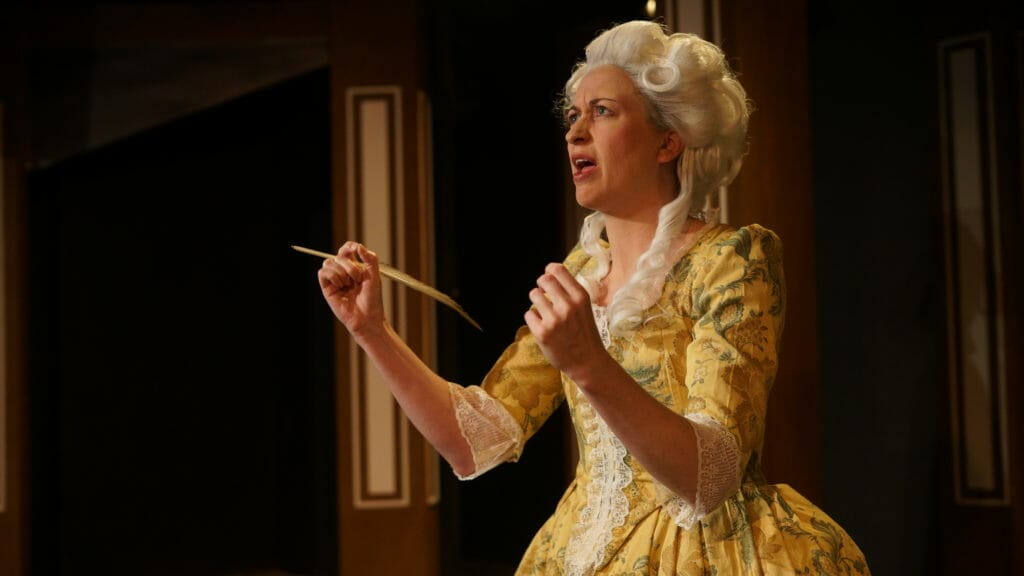Mesmerized and enchanted at the recent performance of THE REVOLUTIONISTS , we were startled by the Stage Manager announcement that one the four actresses performing this work had just hurt her back and the remainder of the performance had to be cancelled. It is the sort of self-referential work with lots of offbeat and quirky humor that for an instant we actually thought he might be part of the show. He was not.
Editor’s Note: Word is that this actress, Stephanie Sullivan, is on the mend and will return to the stage this Saturday June 9 to join her similarly super-talented actress co-stars in this production. Look for our full review of this production soon after.
Meanwhile, as chance would have it, one of our fellow audience members was Mme Brault of the DePaul University French Department. She had just come to know this very actress, Stephanie Sullivan, in another chance encounter.
Read below comments to Picture this Post (PTP) by Pascale-Anne Brault (PB) of DePaul University’s Modern Languages Department, about this play and the French women depicted in this unusual work.
(PTP) How did your meeting with Stéphanie Sullivan, the actress playing Olympe de Gouges, come about?
(PB) By sheer coincidence, I met a French lady in a little Vietnamese restaurant, Simply It, on Lincoln Avenue the day before I was to give my last class of the quarter at DePaul University. Over scrumptious food (and some French wine), we started chatting and it turned out that she was visiting her daughter, an actress currently performing in “The Revolutionists” by Lauren Gunderson at the Organic Theater down the street.
The actress, Stéphanie Sullivan, played one of the main characters, Olympe de Gouges, a fierce advocate for women’s rights from the French Revolution era, who wrote, among other things, the famous “Declaration of the Rights of Women,” and ended up being guillotined for her ideas. She famously said that if women had the right to be guillotined, they should also have the right to have a voice.
Now, it turns out that I have been teaching for the last ten weeks a course entitled “Revolutions” for nineteen undergraduate and graduate students in our French Program. The course began exploring the 1789 revolution and moved on to other revolutions and uprisings that shaped the French nation over the centuries.
It is, as you may know, a bit of a French specialty to take to the streets when they feel their rights are being ignored. And so, we covered the revolutions of 1830 and 1848; the 1871 Commune; May 1968; the feminist revolution of the 1970’s; the 2005 uprisings in the projects around Paris and the 2016 Nuit Debout (sister to Occupy Wall Street). We had studied Olympe de Gouges; a student had given a class presentation on her and several others devoted their final papers to her work. I couldn’t let go of this great opportunity to have my students meet Stephanie and so I invited her to my home the following evening where my last class was being held. What a treat to hear her speak about how moved she had been by the role and interpret some of her lines. This was a chance encounter that made all the difference for the students and me. For how often to do you get to have the texts you study enacted by a professional in front of your eyes? And the fact that Stephanie is French-American was a plus since she was able to speak in French to my students.
Is Olympe De Gouges a very well known figure in France? Was her legacy reborn in the context of more modern feminism? And, is Marianne Angelle, another woman depicted in The Revolutionists a commonly known historic figure?
Olympe de Gouges is known as one of the first French feminists. In my course, we looked at only two other figures beside her: Simone de Beauvoir, author of The Second Sex, and Hélène Cixous, author of “The Laugh of the Medusa” (1975). The students were struck by how modern Olympe de Gouges sounded and how some of her demands were still relevant today.
I was not able to find any information about Marianne Angelle, the character whose experience of slavery led to her efforts to end it in the French colony Saint-Domingue (later Haiti). I suspect that she might be a fictive character (her first name, Marianne, might be a reference to The Marianne, the embodiment of the French Republic and the values for which it stands: “Liberty, Equality, Fraternity”. Every townhall in France owns a bust of Marianne). During the French Revolution, there were a number of anti-slavery movements in France and the colonies and Marianne Angelle might very well be the composite symbol of these movements. Slavery was abolished in all French possessions and territories in 1794, re-introduced by Napoleon in 1802. It was not abolished until 1848.
How do you think this script would be received by a French audience vs an American one? Do you think French audiences would experience the throwing these parallel lives women/historic figures together in one room differently or?
I think that a French audience would receive the play extremely well. Marie-Antoinette and Charlotte Corday are part of everyone’s memories of their days on school benches, learning about French history. Olympe is probably less known outside of academic circles, but her fate is very moving and would appeal to a contemporary audience. The fact that Gunderson brings them all together on a single stage is a coup de génie. The play is fast-paced, at times irreverent and yet so true to real concerns of the time. What did liberty, equality and fraternity really mean for women and those who were slaves?
I would recommend translating the play into French and bringing it to the place that inspired it.
Which parts or moments of this play—or at least the part you got to see—were the most charming to you?
I was totally under the spell from the very first minute. As you know, Lauren Gunderson gathered in her play four different figures from the period of the French Revolution. Besides Olympe, we have Marie-Antoinette (who would like her story to be rewritten in a more favorable light), Charlotte Corday (famous for stabbing Marat, a pro-revolutionist who was actively sending the supposed enemies of the French revolution to the guillotine), and Marianne Angelle, a former slave. The acting is superb; the directing by Bryan Wakefield a wonderful tribute to the text; the modernized language catchy and right on; the three guillotines on stage a stark reminder that freedom often entails the death of many. The Revolutionists is a must see!
When:
Thru July 8, various performance times
Where:
The Greenhouse Theater
2257 North Lincoln
Chicago
Tickets:
$25
Purchase tickets online at the Organic Theater website or by calling the Greenhouse at 773-404-7336.

About the Author: Amy Munice
Amy Munice is Editor-in-Chief and Co-Publisher of Picture This Post. She covers books, dance, film, theater, music, museums and travel. Prior to founding Picture This Post, Amy was a freelance writer and global PR specialist for decades—writing and ghostwriting thousands of articles and promotional communications on a wide range of technical and not-so-technical topics.
Amy hopes the magazine’s click-a-picture-to-read-a-vivid-account format will nourish those ever hunting for under-discovered cultural treasures. She especially loves writing articles about travel finds, showcasing works by cultural warriors of a progressive bent, and shining a light on bold, creative strokes by fledgling artists in all genres.



